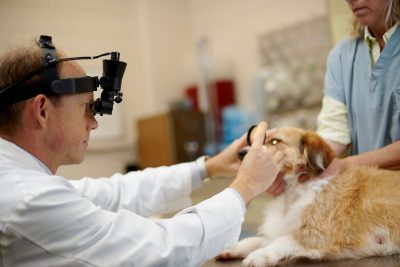Retinitis pigmentosa (RP) is a genetic disorder that causes vision loss and blindness. The retina—a thin tissue that lines the back of the eyeball—has cells which are light sensitive; these cells, called photoreceptors, allow us to see with the information they collect about visual images being sent to the brain. With RP, the photoreceptors, rods, and cones are affected and progressively die. This leads initially to night-blindness; then, loss of peripheral vision causes tunnel vision and finally, legal blindness.

The National Eye Institute of the National Institutes of Health estimates that 1 in every 4,000 humans are affected (approximately 1.5 million people worldwide). Dogs have their own version of RP (called progressive retinal atrophy), and share mutations in the same genes that cause RP in humans. One of these genes, cyclic nucleotide-gated channel b 1 (CNGB1), was identified by the Petersen-Jones lab as causing blindness in dogs, and is the focus of his team’s research, which offers hope for humans and canines suffering from vision loss due to CNGB1 mutations.
In November 2017, Petersen-Jones, Myers-Dunlap Endowed Chair in Canine Health and professor at the Michigan State University College of Veterinary Medicine, and his colleagues published their latest paper in the Journal of Clinical Investigation. The paper, “Patients and animal models of CNGb1-deficient retinitis pigmentosa support gene augmentation approach,” summarizes their research of biomarkers for human patients with CNGb1-deficient RP and gene augmentation therapy in canine and murine models with CNGB1 mutations.
“Dr. Petersen-Jones’ discoveries regarding therapy for retinitis pigmentosa offer hope to both animals and humans suffering from this disease,” says Dr. Vilma Yuzbasiyan-Gurkan, associate dean for Research and Graduate Studies and professor for the MSU College of Veterinary Medicine. “Dr. Petersen-Jones exemplifies the high impact our veterinary clinician scientists have on animal and human health.”
The Process and Findings
Previous research has demonstrated that gene augmentation therapy is a promising treatment for inherited retinal degenerations. Canine and murine models with mutations in CNGB1, which causes approximately four percent of autosomal recessive RP in humans, responded extremely well to gene therapy and revealed that there is a wide window for therapeutic intervention. For this research to progress, relevant animal models and biomarkers of progression are required to assess therapeutic outcomes. Petersen-Jones has established a team of collaborators to do just that.
“Our collaborators at Columbia University and Wills Eye Hospital evaluated retinitis pigmentosa patients with CNGB1 mutations for potential biomarkers of progression of retinal degeneration, and we compared the human phenotypes with those of dogs with the same disease and with mice models,” says Petersen-Jones. “It turns out that CNGB1 gene mutations in humans, dogs, and mice result in very similar disease. This includes early loss of rod function and slow rod photoreceptor loss, as well as a secondary decline in cone function. The collaboration showed that advanced imaging techniques showed promise for closely evaluating RP progression in human patients. Most importantly, the MSU team showed that gene therapy was able to restore vision to dogs with a CNGB1 mutation. “This therapy not only made the rod photoreceptors of affected dogs function, but this was sustained and stopped the retinal degeneration that occurs with this condition.”
“The very exciting thing is that these results indicate that there is a wide window for therapeutic intervention,” continued Petersen-Jones. “This means that there is real promise to be able to take this treatment into the clinic to treat RP patients with CNGB1 mutations.”
The team will continue their collaboration to go through the various stages needed before starting a clinical trial for CNGB1-RP. For more information on Petersen-Jones’ research, contact communications@cvm.msu.edu.
